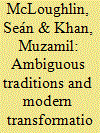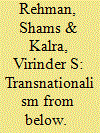|
|
|
Sort Order |
|
|
|
Items / Page
|
|
|
|
|
|
|
| Srl | Item |
| 1 |
ID:
075916


|
|
|
|
|
| Publication |
2006.
|
| Summary/Abstract |
Against current debates about the gradual 'Islamisation' of South Asia by Sufi cults, and the shifting ambiguity and fixity of religious boundaries in colonial India, this article is an account of the cult of the Qadiriyya-Qalandariyya saints in the Mirpur district of Pakistan-administered Kashmir. Mirpur is perhaps best known in Pakistan for its diaspora, especially in the United Kingdom where there is a significant literature on the cultural and economic dimensions of that now longstanding presence. However, there is still little specific or detailed ethnography of homeland traditions of Mirpuri religiosity. Based upon research in Mirpur and Britain, this article is an original attempt to fill this significant gap. It focuses on the cult of two 'intoxicated' Sufi saints at Kharri Sharif, the most significant shrine complex in the region, and makes use of textual sources of sacred biography and romantic poetry, as well as first-hand participant observation. In this regard we follow Werbner and Basu (1998) who view Sufi Islam as 'a single, total, symbolic reality'. We also adopt their innovative agenda for study of 'the connections [and, we suggest, the possible disconnections] between Sufi cosmologies, ethical ideas, bodily ritual practices and organisational forms'. Ultimately, it is argued that the Qadiriyya-Qalandariyya cult is presently waning, having produced no living saint to act as ethical guide since the beginning of the twentieth century. Moreover, while the popularity of demotic ritual embodying a Sufi cosmology continues unabated in Mirpur, since Partition a neo-orthodox epistemology has (rather belatedly) begun to transform dominant socio-religious discourses in the region. Indeed, Kharri Sharif and the income from its offerings have also come under the control of the ministry of awqaf (pious endowments). Thus, the Qadiriyya-Qalandariyya cult appears to lack both the charismatic leadership and organisational autonomy that has allowed other Sufi cults to imagine 'spaces of potential freedom' beyond the stranglehold of the postcolonial state.
|
|
|
|
|
|
|
|
|
|
|
|
|
|
|
|
| 2 |
ID:
075913


|
|
|
|
|
| Publication |
2006.
|
| Summary/Abstract |
This special issue of Contemporary South Asia celebrates 20 years of the annual Pakistan Workshop held in the Lake District of England. This event, the primary raison d'être for the Pakistan Studies Group, has consistently provided a forum for researchers of Pakistan, the Pakistani Diaspora, and Muslim groups of other South Asian countries to meet and exchange ideas. The main impetus for the Workshop has always come from anthropologists, but representatives from other disciplines have been an integral part of what makes it both successful and worthwhile. This issue brings together some important papers on Pakistan and the Pakistani Diaspora from recent participants in the Workshop. One of the dominant themes that emerge from this collection is that Pakistan is complex, and defies simple categorisation. The country is conservative and traditional while being modern and progressive. It is a wealthy nation in some ways, although it is impossible to deny its overwhelming poverty. There are horrendous acts of violence in a country that is by and large very peaceful. This is not to say that there are not clear patterns that emerge, nor that it is impossible to make any generalisations about Pakistan. However, this issue does suggest that a crude superficial characterisation of Pakistan, at best, is probably unhelpful. Hence the need for edited volumes, monographs, and articles that address Pakistan's diversity and vibrancy, and situate the country appropriately within its role in the wider world stage.
|
|
|
|
|
|
|
|
|
|
|
|
|
|
|
|
| 3 |
ID:
075915


|
|
|
|
|
| Publication |
2006.
|
| Summary/Abstract |
In the wake of 7/7, the British Government assembled seven Muslim working parties to address a range of issues that might contribute to an environment less hospitable to the creation of further suicide bombers. The resulting recommendations envisaged an outward-looking Islamic leadership engaging Muslim youth, local schools, public and civic bodies, as well as being hospitable to other faith groups. This article aims at shedding some light on the status and training, as well as the religious discourses and tasks of religious leaders in British Pakistani communities. The conclusion will discuss their capacity for being bearers of bridging social capital, as auspicated by the government.
|
|
|
|
|
|
|
|
|
|
|
|
|
|
|
|
| 4 |
ID:
075917


|
|
|
|
|
| Publication |
2006.
|
| Summary/Abstract |
The earthquake that shook Jammu & Kashmir, Pakistan, and India on 8 October 2005 had major consequences for the region in all areas of life. An assessment of the damage and loss of life and need for relief is ongoing. This article examines the transnational fund-raising effort that arose in the immediate aftermath of the earthquake. By offering a particular case study of the fund-raising effort in the north of England, we hope to illustrate the general mechanisms by which aid was collected among diaspora communities. Our contention is that diaspora fund-raising and distribution was initially able to respond in a more direct and effective manner than states and non-governmental organisation. The reason for this was the utilisation of existing active and hitherto dormant transnational links.
|
|
|
|
|
|
|
|
|
|
|
|
|
|
|
|
| 5 |
ID:
075914


|
|
|
|
|
| Publication |
2006.
|
| Summary/Abstract |
The intention of this paper is to consider and evaluate the hypothesis that Mullah Omar, the Taliban leader, was inspired and guided by true night dreams (al-Ruya) to found and lead the Taliban revolution in the 1990s in Afghanistan. The paper contains small excerpts from an interview with Ramimullah Yusufzai, the well-respected British Broadcasting Corporation journalist in Peshawar, Pakistan, which offers first-hand evidence that Omar's charismatic leadership was founded on his commanders' and followers' belief in his divine guidance through night dreams. Such a belief in true dreams, commonplace throughout Islam, is based on the example of the Prophet Mohammed who is reported to have dreamt parts of the Koran. 1 Thus the paper begins by outlining the Islamic metaphysical and epistemological context that facilitates Muslim belief in true dreams.
|
|
|
|
|
|
|
|
|
|
|
|
|
|
|
|
|
|
|
|
|